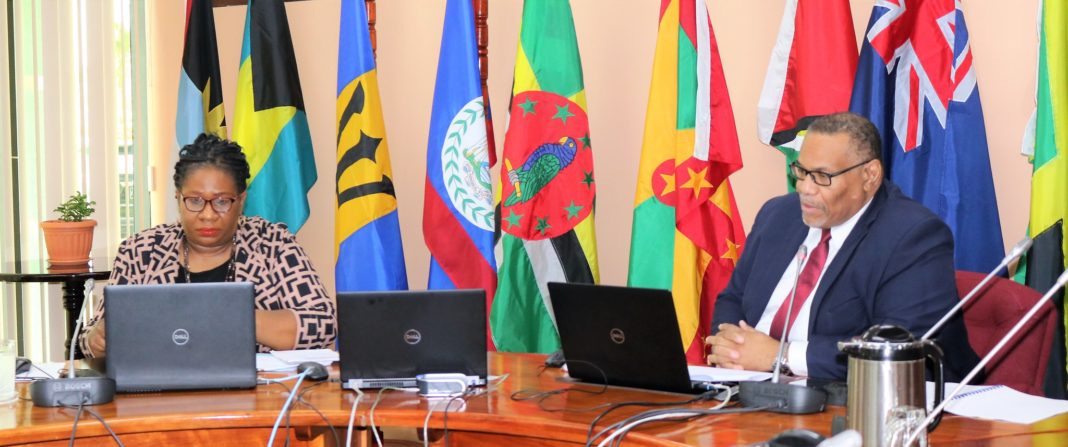Ministers of ICT on Friday unanimously approved the CARICOM Secretariat-led action plans to accelerate the Region’s digital transformation.
The Secretariat presented the plans to the Ministers at a Special Meeting of the Council for Trade and Economic Development (COTED) on ICT which was held virtually.
The plans include the draft action plan for fast-tracking digital transformation, Girls in ICT Partnership Action Plan, and the draft action plan for the CARICOM Digital Skills Task Force.
The Ministers recognised that digitalisation has wide-ranging and significant impacts on the economy and society and needed a broader range of new policy issues. They agreed to strengthen policy consolidation and alignment and to deepen the cooperation on digital transformation in CARICOM in 2022.
Deputy Premier of Montserrat, Dr. Samuel Joseph,chaired the Meeting and encouraged CARICOM Member States to continue the progress they had made over the past two years in the area of digital transformation.

Dr. Joseph, who is also Montserrat’s Minister for Communications, Works, Energy and Labour, was at the time delivering remarks at the opening of the Special COTED. Matters before the Ministers of ICT included fast-tracking the digital transformation of the Region; the removal of roaming rates; establishing a Single Regional Telecommunication Regulator; and determining the 2022 priority initiatives to achieve the CARICOM Single ICT Space.
At the COTED ICT meetings held in 2019 and 2020, Ministers of ICT identified priority areas of focus which included the removal of roaming charges and the zero-rating of government websites. Also, in the wake of the COVID-19 pandemic, the ICT ministers mandated the development of an action plan to fast-track digital transformation. Heads of Government, at their meeting in February 2021 re-iterated the mandate and also mandated the Secretariat to examine the feasibility of establishing a Single Regional Telecommunications Regulator. The draft report on the feasibility of the Single Regional Telecoms regulator was accepted in principle and lays the groundwork for further national and regional discussion before consideration by the Heads of Government in July 2022.
Front burner
Minister Joseph pointed out in his remarks that the pandemic had placed digital transformation on the front burner of countries and organisations.
“…so a lot is riding on our shoulders to deliver and meet customer, stakeholder and citizens now changed expectations of the services and new delivery modes – which can be demanded of governments,” he told delegates at the Special Meeting.
He highlighted the resilience that was evident in the sector since the pandemic – the first in the Information Age – began in 2020, as information and communication technologies became more integral to personal and professional life.
“Some of our efforts in tackling the COVID-19 outbreak and pandemic showed many countries responding decisively and quickly. Many developed a suite of digital tools to help disseminate timely information, enable our agencies to manage the crisis more effectively facilitate contact tracing and support our wider efforts to resume business in a safe manner. Some of us have moved to capitalise on the investments made to our digital infrastructure by introducing digital nomad and ‘work from paradise’ programmes – Montserrat being the most recent in CARICOM,” he said.
The progress that Member States gained over the two years, he said, “must not stop now”. He reiterated the need for “whole of government” approaches in the ongoing transformation, a strategy that ICT Ministers had agreed to advocate for in 2019.
“Our governments must continue to be innovation-led. Now is the time to re-engineer our processes, share information, cement the pillars of the CARICOM digital economy, and transform to create the right opportunities for our businesses and people,” he said.
Work on multiple tracks
He added that it was obvious that governments had to continue working on several tracks towards digital, technical and scientific excellence.
He told the Meeting that governments had to agree to move on areas including digital public service delivery; digital skills for the general workforce; digital infrastructure; cyber security; reliable, secure data flows.
Acknowledging that “significant challenges” accompanied digital transformation Minister Joseph said countries must consider their own processes and ability to support the work of other Councils and Organs of the Caribbean Community and “make tough decisions to re-organise ourselves for speed and agility”.
His remarks on reform resonated with Mr. Joseph Cox, CARICOM Assistant Secretary-General, Economic Integration, Innovation and Development, who stressed that COTED ICT must begin to make beneficial cross-sector linkages.
“Productive sector plans and digital transformation cannot exist on parallel roads and adjudicated in parallel Councils of the Community,” he pointed out.
In his remarks at the opening of the Meeting, he acknowledged that the challenges the technological and geopolitical development posed in 2022 were not easy. The Region’s ability to analyse and position itself for and in critical niche areas along the various global value chains were paramount in moving forward, he said.
“This could prove to be another historic opportunity and a call for action for us to truly transcend our collective size and leverage technology both in the physical dimensions (air, land and sea connectivity), but also in the non-physical dimensions (data, financial, skills and talent), ASG Cox said.





